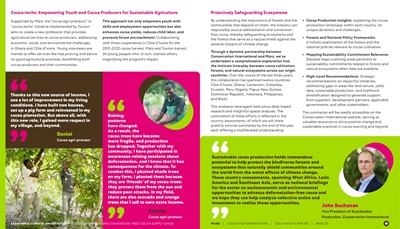
Proactively Safeguarding Ecosystems
By understanding the importance of forests and the
communities that depend on them, the industry can
responsibly source deforestation and conversionfree
cocoa, thereby safeguarding ecosystems and
the forests that serve as a natural shield against the
adverse impacts of climate change.
Through a dynamic partnership between
Conservation International and Mars, we've
undertaken a comprehensive exploration into
the intricate interplay between cocoa cultivation,
forests, and natural ecosystems across our origin
countries. Over the course of the last three years,
this collaboration has spanned twelve countries:
Côte d'Ivoire, Ghana, Cameroon, Colombia,
Ecuador, Peru, Nigeria, Papua New Guinea,
Dominican Republic, Indonesia, Philippines,
and Brazil.
This endeavor leveraged meticulous desk-based
research and insightful spatial analyses. The
culmination of these efforts is reflected in the
country assessments, of which we will share
publicly concise summaries by the end of the year,
each offering a multifaceted understanding:
Cocoa Production Insights: explaining the cocoa
production landscape within each country, its
unique dynamics and challenges.
Forests and National Policy Frameworks:
A holistic examination of the forests and the
national policies relevant to cocoa cultivation.
Mapping Sustainability Commitment Relevance:
Detailed maps outlining areas pertinent to
sustainability commitments related to forests and
natural ecosystems when data are available.
High-Level Recommendations: Strategic
recommendations on impactful initiatives,
addressing gaps in areas like land tenure, yield,
data, sustainable production, and livelihood
diversification designed to generate support
from suppliers, development partners, applicable
governments, and other stakeholders.
The summaries will be readily accessible on the
Conservation International website, serving as
valuable resources to drive positive change and
sustainable practices in cocoa sourcing and beyond.
Cocoa-techs: Empowering Youth and Cocoa Producers for Sustainable Agriculture
Supported by Mars, the "cocoa agri-preneurs" or
"cocoa-techs" initiative implemented by Touton
aims to create a new profession that provides
agricultural services to cocoa producers, addressing
economic, social, and environmental challenges
in Ghana and Côte d'Ivoire. Young volunteers are
trained to offer services like tree pruning and advice
on good agricultural practices, benefitting both
cocoa producers and their communities.
This approach not only empowers youth with
skills and employment opportunities but also
enhances cocoa yields, reduces child labor, and
prevents forest encroachment. Collaborating
with three cooperatives in Côte d'Ivoire for the
2021-2022 cocoa harvest, Mars and Touton trained
24 young people who, in turn, trained others,
magnifying the program's impact.
Thanks to this new source of income, I
see a lot of improvement in my living
conditions. I have built two houses,
set up a pig farm and reinvested in my
cocoa plantation. But above all, with
this new role, I gained more respect in
my village, and beyond.
Raining
patterns
have changed.
As a result, the
cocoa trees have become
more fragile, and production
has dropped. Together with my
community, I have participated in
awareness-raising sessions about
deforestation, and I know that it has
consequences for the climate. To
combat this, I planted shade trees
on my farm. I planted them because
they are 'friends' of my cocoa trees:
they protect them from the sun and
reduce pest attacks. In my field,
there are also avocado and orange
trees that I sell to earn extra income.
Daniel
Cocoa agri-preneur
Charles
Cocoa agri-preneur
Sustainable cocoa production holds tremendous
potential to help protect the biodiverse forests and
ecosystems that naturally shield communities around
the world from the worst effects of climate change.
These country assessments, spanning West Africa, Latin
America and Southeast Asia, serve as national briefings
for the sector on socioeconomic and environmental
opportunities to advance deforestation-free cocoa and
we hope they can help catalyze collective action and
investment to realize those opportunities.
John Buchanan
Vice President of Sustainable
Production, Conservation International
MARS | COCOA FOR GENERATIONS | 2022 ANNUAL REPORT | PAGE 20
CREATING A CLIMATE-SMART FUTURE | DEFORESTATION AND CONVERSION-FREE COCOA SUPPLY CHAIN